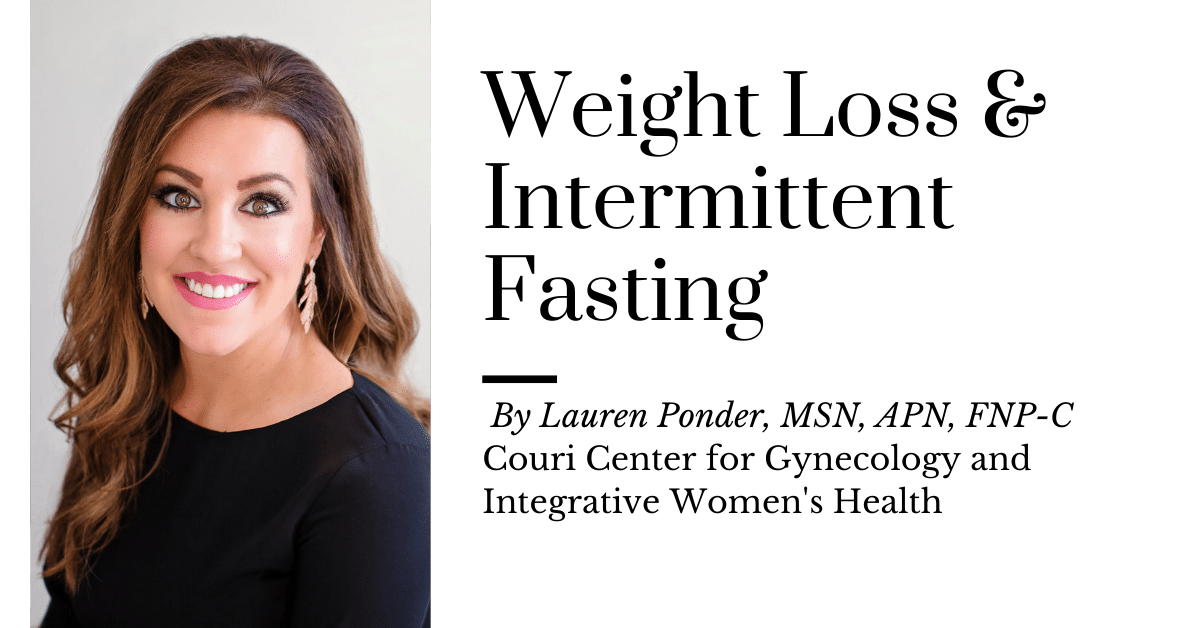
Here at the Couri Center, we pride ourselves on our comprehensive approach to women’s healthcare. Our practice allows us the unique ability to focus on the medical aspect of women’s health and meet the needs of our patients from a wellness standpoint. One of the biggest influences on our health and well-being is how we fuel our bodies. Food and nutrition choices can either be the catalyst, or the deterrent, to meeting the lifestyle goals we hope to achieve. We can all relate to the saying, “if you look good, you feel good.”
Intermittent fasting (IF) has been shown to provide countless health benefits and is proven to be an extremely successful tool to assist in managing many chronic diseases ranging from diabetes to obesity to cardiovascular disease. Since the 1970s, societal trends have shown that our eating habits have gone from eating three meals per day with an occasional snack to eating multiple meals a day and frequent snacks intermixed. Not only has the number of times we eat per day increased but with the convenience of pre-packaged and “on-the-go” snacks, so too has our consumption of processed foods. Trends also show that, on average, American adults are eating later into the day/night than ever before. Given the above trends, there is no surprise that our country has a growing obesity epidemic.
There are several different approaches to intermittent fasting. It is important to choose a method that best fits your lifestyle while also achieving your individual health goals. IF is one of the fastest ways to get your body into a fat-burning state without dieting. When we eat, our body has to decide whether to burn fat or store it; it can not do both. Generally speaking, every time we eat, it causes our insulin levels to increase. If we never go more than a few hours between eating, our insulin levels do not have a chance to return back to baseline and thus result in a constant state of elevated insulin. Elevated insulin levels cause our bodies to store fat and thus contribute to weight gain. Conversely, fasting allows our insulin levels to fall, resulting in a fat-burning state which contributes to weight loss. Weight loss is also thought to be a result of decreased caloric intake from limiting feeding windows.
In addition to weight management and better insulin and glycemic control, intermittent fasting has also decreased systolic blood pressure, cholesterol levels, and triglycerides. While IF may seem like a daunting task at first, one in which you’ll always be hungry, the exact opposite is true. According to one research study published in the New England Journal of Medicine, researchers found that IF causes ghrelin levels, the hormone responsible for hunger, to decrease within hours to days after implementation. This is important because women have higher ghrelin spikes than men, which is also linked to why we experience more cravings than our counterparts. IF can control both hunger and cravings and improve weight and decrease cardiovascular risk factors (cholesterol, etc.) without ever eliminating a single food group from your diet. That being said, eating a well-balanced diet high in fruits and vegetables and low in processed foods will obviously get you better results sooner.
Intermittent fasting has been around for hundreds of years. The data is more than sufficient for leading health experts to confidently say that IF is one of the best ways to lose/maintain weight and manage chronic diseases like diabetes, obesity, and cardiovascular disease. This is very exciting as it does not require eliminating certain food groups, counting calories, or reading food labels. By simply following strict feeding and fasting windows, you can achieve significant health benefits that improve your health and optimize your quality of life. IF is not a diet. It is a lifestyle, which is why long-term outcomes of IF tend to last compared to alternative options. There are many respected experts in this field, but I personally love Dr. Valter Longo, Dr. Jason Fung, and Cynthia Thurlow, APN. Locally, our Registered Dietitian/Nutritionist can also assist you with Intermittent Fasting and help you develop a program to achieve your personal wellness goals. Schedule a complimentary consultation today. We’re here to help.
Lauren Ponder, MSN, APN, FNP-C
Sources:
Furmli S, Elmasry R, Ramos M, & Fung J. Therapeutic use of intermittent fasting for people with type 2 diabetes as an alternative to insulin. BMJ Case Rep. 2018 October 9;2018:bcr2017221854. doi: 10.1136/bcr-2017-221854. PMID: 30301822; PMCID: PMC6194375
Ganesan, K., Habboush, Y., & Dagogo-Jack, S. (2020). Calorie restriction and intermittent fasting: Impact on glycemic control in people with diabetes. Diabetes Spectrum. 2020 May; 33(2).
Sumithran, P., Al., E., Author Affiliations From the Departments of Medicine (P.S., Others, P. T. and, Others, N. B. and, Others, B. N. and, Y. M. Bar-On and Others, A. S.V. Shah and Others, & S. J. Thomas and Others. (2012, January 26). Long-term persistence of hormonal adaptations to weight loss: Nejm. New England Journal of Medicine. Retrieved September 1, 2021, from https://www.nejm.org/doi/full/10.1056/NEJMoa1105816. OI: 10.2337/ds19-0064
